Earth Cables


Pulsara Underground cable ø 1,6mm. Available in 100m, 50m and 25m reel from £ 15.99. Choose your options.


Double insulated lead-out cable to connect the energiser with the fence and to make underground connections (e.g. gateways). Use this 10 m cable for short distances.


Double insulated lead-out cable to connect the energizer with the fence and to make underground connections (e.g. gateways). Use this 50 m cable for short distances.
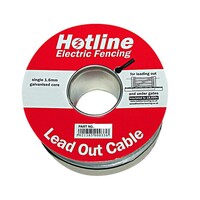

- Hotlines HT/G
- 100m Insulated lead out cable with a 1.6mm galvanised steel core is used to carry power from the mains energiser unit to the fence line, to the earth spike and also for any other electric fence connections such as line to line, through vege


Ground Cable - 1.6 mm (50 m) – Double-insulated, high-voltage cable with a galvanised steel core for above-ground and underground electric fence connections. Ideal for fences up to 100m, providing reliable low-resistance power supply.


Double insulated lead-out cable to connect the energizer with the fence and to make underground connections (e.g. gateways). Use this 25 m cable for short distances.


Hotline double insulated steel lead-out/underground cable 25 m x 1.6 mm


Excellent connections between different lead-out cables are essential to prevent power loss. A safe, waterproof, underground connection between two ground cables to prevent power loss in the electric fence.
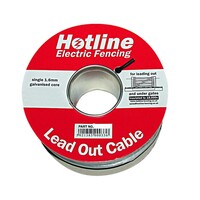

- Hotline Insulated Steel Lead-Out / Underground Cable
- 50m x 1.6mm.


Double insulated lead-out cable to connect the energiser with the fence and to make underground connections (e.g. gateways). Use this 100m cable for long distances.


Double insulated lead-out cable to connect the energiser with the fence and to make underground connections (e.g. gateways). Use this 50 m cable for long distances.


50 meter lead out XL cable coated with a heavy duty double insulation. Good quality polyethylene for abrasion resistance in the ground. 2,5 mm medium tensile aluminium coated wire 4 times the conductivity of 2,5 mm galvanised wire.
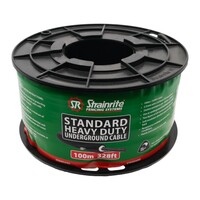

Strainrite heavy duty 100m underground cable with double insulation and UV-resistant LDPE coating. Easy to work with, made from soft 12.5 ga galvanised wire, made in New Zealand.


Hotline Insulated steel Lead-Out Cable - 2.5mm x 50m.


Double insulated lead-out cable to connect the energizer with the fence and to make underground connections (e.g. gateways). Use this 25 m cable for long distances.
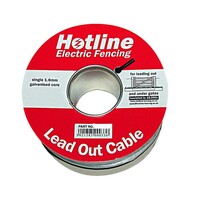

- Hotlines HT/G
- Insulated lead out cable with a 1.6mm galvanised steel core is used to carry power from the mains energiser unit to the fence line, to the earth spike and also for any other electric fence connections such as line to line, through vegetati


200 meter XL lead out cable coated with a heavy duty double insulation. Good quality polyethylene for abrasion resistance in the ground. 2,5 mm medium tensile aluminium coated wire 4 times the conductivity of 2,5 mm galvanized wire.
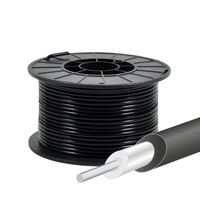

Pulsara Ground cable 2,5mm. Available in 50 m, 100 m or 500 m.


The HT Cable Connector is a waterproof cable connector designed to safely join lengths of high voltage lead out (HT) and other underground cables. The connector is suitable for all lead-out cable connections.